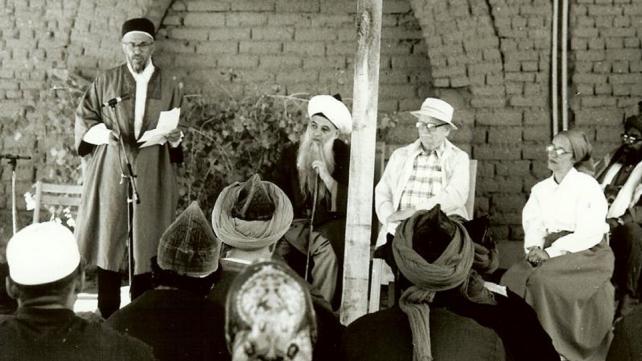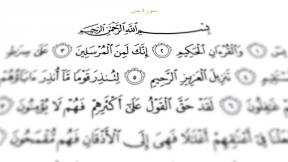
Do you know what happened to this scholar?
Most likely not.
Dr. Irving was once a fixture at Muslim conventions. This author, professor and translator of the first American English translation of the Quran who accepted Islam over 50 years ago is Alhamdu lillah alive. But he is in very bad shape.
Dr. Irving is suffering from an advanced case of Alzheimer's disease and has been moving between a nursing home and a hospital in Mississippi.
No Muslim newspaper has published anything about his condition or even mentioned whether he is alive or not. We need to remember our scholars. We need to be there for them with our concern, our Dua and our good wishes, especially at this time as they prepare to leave this life.
The current state of this translator of the Quran can remind us of Yusuf Ali, another Muslim whose translation of the Quran into English is world renown.
Yusuf Ali did not need money to take care of himself. But when he passed away on a cold London night about 50 years ago, he was sick and alone. The Muslim community only came to know later about his death.
Some background on Dr. Irving
It was Muslim "stubborness" which eventually led the Canadian Quran translator and writer Thomas Ballantyne (T.B.) Irving to Islam.
"I remember especially a missionary returned from India stating how the 'Mohometans' (Muslims) were so obdurate in adhering to their religion; that was my first encounter with Islam, and it roused an unconscious admiration in me for their steadfastness to their faith and a desire to know more about these 'wicked' people," he recounted in the book "Islam: Our Choice", a collection of interviews with Muslims who have converted to the faith.
T.B. Irving later became one of these "obdurate" people, choosing the name Al Hajj Ta'lim Ali Abu Nasr.
Born in Preston, Ontario in 1914, this professor, writer, translator and activist is best known for his translation of the Quran entitled, The Quran: First American Version (1985).The work is an attempt to make the English translation of the Quran more readable to an audience not used to the old style of English common in most translations.
Irving was particularly concerned about making the Quran accessible to Muslim youth in North America.
"A new generation of English-speaking Muslims has grown up in North America which must use our scripture differently than their fathers would have done. Their thinking roots have become distinct on a new continent without the familiar use of our holy tongue, and a great difference has developed between their customs and their ancestral faith," he writes in the introduction of his translation.
The cover of the 1993 edition of the Quran translation features a photograph of the dome of the Great Umayyad Mosque of Cordoba, Spain. This provided a hint at another passion of his: Muslim Spain.
Irving was considered a leading expert on the Arab-Islamic period in Spanish history, especially with his book Falcon of Spain. This was a study of Spain under Muslim rule, with a special emphasis on the Umayyad ruler AbdurRahman I whom Irving considered a "great statesman".
Irving's other books include: Growing Up In Islam, The Quran: Basic Teachings, which he co-authored with Dr. Khurshid Ahmad and Muhammad Manazir Ahsan, Had You Been Born a Muslim, Religion and Social Responsibility and Tide of Islam.
His academic and teaching career features a diverse list of universities that span the continent, including McGill University in Montreal, Canada, Princeton University in New Jersey, University of San Carlos in Guatemala, University of Minneapolis and the University of Tennesse, from which he retired as a professor of Spanish and Arabic in 1980.
Following retirement, he served as the dean of the American Islamic College in Chicago between 1981-1986. It was during his time there that he published his translation of the Quran.
His service to Islam as a writer was noticed by the Pakistani government, who rewarded him the Star Imtiaz award for service to Islam in 1983.
Dr. Irving today: Needs your Duas and thanks
Dr. Irving's son, Nicholas Irving, moved from Guatemala to take care of his father. While Dr. Irving is not in need of monetary or medical help, he could definitely benefit from hearing from you, especially if you have benefited from his work as a writer and scholar.
Although he cannot talk and he can only eat with the help of a feeding machine, he is conscious. He still receives mail. In these last days of his life, he is in need of your prayers, your letters, wishes of concern as well as thanks for his service to Islam.
Photo Attribution: http://theamericanmuslim.org/tam.php/features/articles/profile_professor_thomas_ballantine_tb_irving




Comments
I have just recently discovered the highly accessable, contemporary English interpretation of the Noble Qur'an published by Dr. Irving, and am struck by how effective it is in communicating this glorious text to an average English speaker. This book should be in the library of every North American Mosque, to serve as a practical introduction to our faith.Truly it is disgraceful that Dr. Irving's stunning contribution to propogating Islam has gone unrecognized by Muslims, who insist on subordinating this English language interpretation, to ones which are very difficult to read through and thus appear obscure. May Dr. Irving rest in peace, and be appreciated for the gift with which he has left the Muslim community.
Location
Add new comment